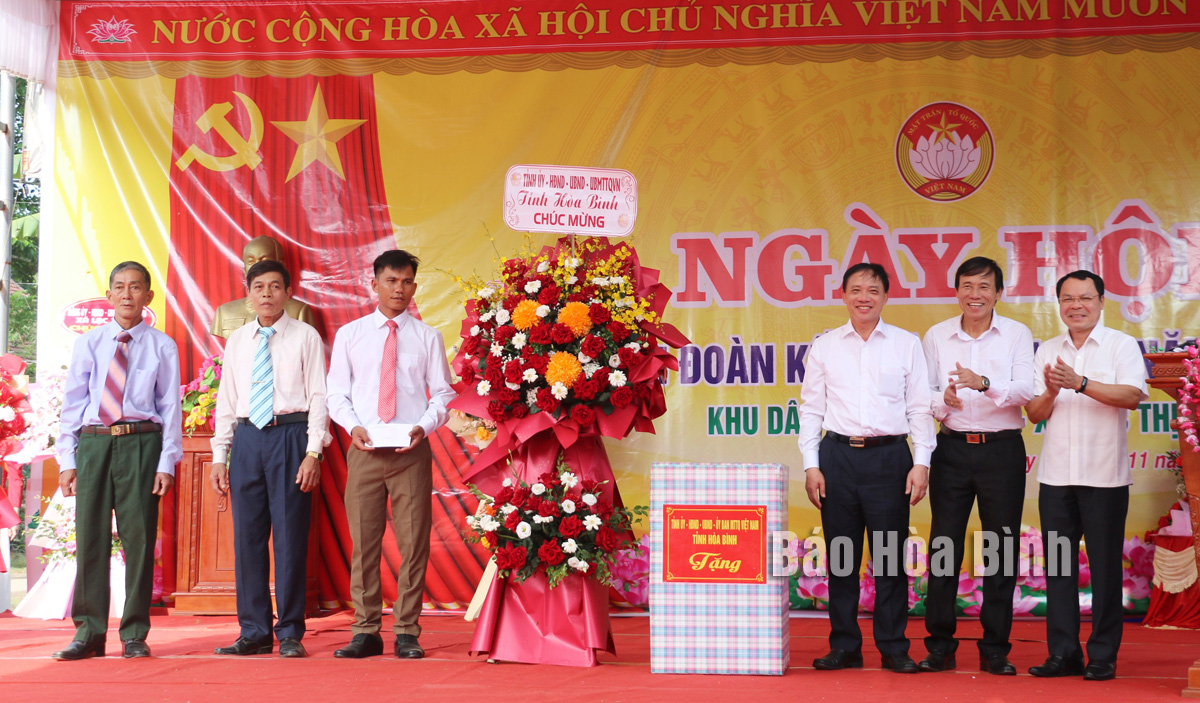
Trac village in Lac Thinh commune of Yen Thuy district organised the National Great Solidarity Festival 2023 on November 4, which was attended by Bui Van Khanh, Deputy Secretary of the Hoa Binh Party Committee and Chairman of the provincial People’s Committee, and Nguyen Tien Sinh, member of the provincial Party Committee and Chairman of the Committee’s Inspection Commission.
Bùi Văn Khánh, Deputy Secretary of the Hoa Binh Party Committee and Chairman of the provincial People’s Committee, presents flowers and gifts to representatives of Trac village of Lac Tinh commune, Yen Thuy district.
Trac village is home to 194 households with 910 people who are mostly from the Muong ethnic minority group. This year, local officials and residents have actively responded to movements and campaigns, especially the campaign of "all-people foster solidarity in building new-style rural areas and civilised urban areas".
Local residents have shown strong solidarity to overcome difficulties and promote socio-economic development, boosting the growth of their residential areas in all fields. The annual per capita income of the village is estimated at 50 million VND (2,053 USD), while the rate of poor households has been reduced to 3.09, and 95% of local families have been recognised as cultural families. No law violation or denunciation has been reported in the locality.
Addressing the festival, Bui Van Khanh, Deputy Secretary of the Hoa Binh Party Committee and Chairman of the provincial People’s Committee, hailed the achievements that the village has gained. He asked the Party Committees and administration as well as the Vietnam Fatherland Front (VFF) Committees and its members at all levels to continue to promote the strength from people’s great solidarity as well as the people’s will, aspirations and creativity in protecting and building the homeland in the new situation.
At the same time, it is necessary to continue to encourage locals to implement the Party and State’s policies and laws, while mobilising resources to speed up the implementation of the resolutions of the Party Congresses at all levels, he said.
Khanh also underlined the need for more specific actions to care for locals’ life, along with the implementation of the democracy rules and the settlement of problems right from the grassroots level, and the strengthening of people’s trust in the Party, State and local administration.
On the occasion, the provincial Party Committee, People’s Council, People’s Committee, and VFF Committee as well as sectors presented gifts to locals and officials of the village. Outstanding collectives, individuals, families, and students of the village were also honoured.
The clothing of women reflects the culture of the Muong, Thai, Tay, Dao, and Mong ethnic groups in the northern province of Hoa Binh.
Gongs hold a special place in the cultural and spiritual life of the Muong ethnic people in Hoa Binh province. More than musical instruments, they are an indispensable part of community rituals and collective memory, echoing through generations as a spiritual thread linking the past, present, and future.
Preserving and promoting the cultural values of the Muong ethnic group has become an urgent task in the current context, as many traditional values face the risk of fading away. This effort requires not only protecting the cultural identity but also eliminating outdated customs and developing a modern cultural lifestyle, contributing to sustainable values for the Muong community in Hoa Binh province.
The Muong ethnic culture, deeply rooted in Vietnam’s mountainous north, continues to be preserved and revitalised by dedicated individuals and communities determined to safeguard their ancestral identity.
The Muong group is one of the largest ethnic minorities in Vietnam, primarily found in Hoa Binh province. The Muong people in Hoa Binh boast a rich and diverse cultural treasure that reflects the unique identity of this ethnic group. Accounting for over 63% of the province's population, they have created and preserved numerous distinctive cultural values, contributing to their unique identity. Their cultural heritage is an invaluable asset, at the heart of their national identity, and represents a vibrant spiritual life that must be preserved and promoted in today’s modern world.
For generations, the ethnic communities of Hoa Binh province, particularly the Muong people, have preserved vibrant festivals deeply intertwined with the region’s geography, nature, and social traditions. These celebrations enrich Hoa Binh’s spiritual life and cultural identity, reflecting both folk beliefs and the intermingling of ethnic customs. Many of these festivals have endured the test of time, passed down through generations and continuing to thrive today. Among them, the Khai Ha (Going Down to the Field) festival stands out as one of the most significant events of the Muong ethnic group.



